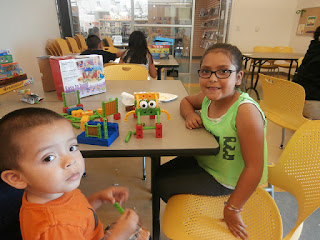Mon-Fri 8:00am - 6:00pm EST
Monday, November 28, 2016
7 Benefits of Structured Play
Photo by San Jose Library (Flickr)
What do puzzles, Simon Says, and basketball have in common? They are all games my girls enjoy, and they are examples of structured play, activities that can be led by an instructor for the purpose of teaching a lesson or skill. This type of play is different from free play (kids choose the activity and play without adult guidance) or risky play (roughhousing, climbing, and racing). While all types of play are important, structured play provides seven key benefits and allows our kids to have fun as they learn.
Nudges Kids Out of Their Comfort Zones
When left to their own devices, my girls would play the same familiar games and with the same familiar toys. It's important, though, that they stretch their wings and get out of their comfort zones sometimes. Structured play introduces kids to new games and new playmates. Nudging them out of their comfort zone ultimately helps them become well-rounded and more confident individuals.
Improves Social Skills
One of my daughters doesn't enjoy group play with strangers. She prefers playing with people she knows. In her case, structured play at school, the playground, and summer camp encourages her to make new friends and be more social. I love watching her blossom socially, learn to communicate, and develop important social skills as she plays.
Teaches Teamwork
Life is filled with opportunities for our kids to work in teams. Structured play teaches kids how to respect the abilities and opinions of others, exchange ideas, and put themselves aside in favor of the greater good and the team. I appreciate band, board games, and soccer as three examples of structured activities that teach my girls teamwork. This type of play also equips them to be comfortable leading others and following, two essential teamwork traits.
Cultivates Imagination and Creativity
My girls have big imaginations and well-developed creativity in part because I encourage them to consider imaginary scenes as they play. They become spaceships while zooming through the play room picking up toys, and they turn into minnows while I'm the shark during tag. Even though structured play includes adult direction, many games and activities require kids to be flexible and use their imaginations and creativity. With these skills, kids have fun and cultivate the ability to think outside the box in daily life.
Hones Problem-Solving Skills
When faced with a challenge during a board game, kids have to consider different strategies for solving the problem. I will sometimes coach my girls to help them think about how their move will affect the game's outcome, but generally, I let them think through the situation themselves. These situations hone my girls' problem-solving skills. They're better able to come up with solutions in real life because of structured play.
Develops Emotional Skills
Identifying and expressing emotions is a learned skill. Since my girls were toddlers, I've used structured play opportunities to help them identify and express their emotions. Together, we've worked through disappointments over losing at Uno and frustrations over missing puzzle pieces. We've also learned to empathize with others, show kindness, and acknowledge grief as we've played.
Boosts Physical Activity
The Centers for Disease Control and Prevention recommend at least 60 minutes of exercise per day for our kids. Use structured play to help your children move. Play hopscotch on the walk home from school, have them run from the laundry room to their bedrooms as they put away laundry, or organize a game of Capture the Flag with the neighbors. This activity can prevent obesity and make sure our kids stay active.
Structured play provides seven key benefits for our kids. It's fun, too! How will you add more structured play time and its benefits into your child's life this week?
Find more about the author: Kim Hart
Playgrounds
Swing Sets and Slides
Structures and Furniture
Subscribe to:
Post Comments (Atom)


No comments:
Post a Comment